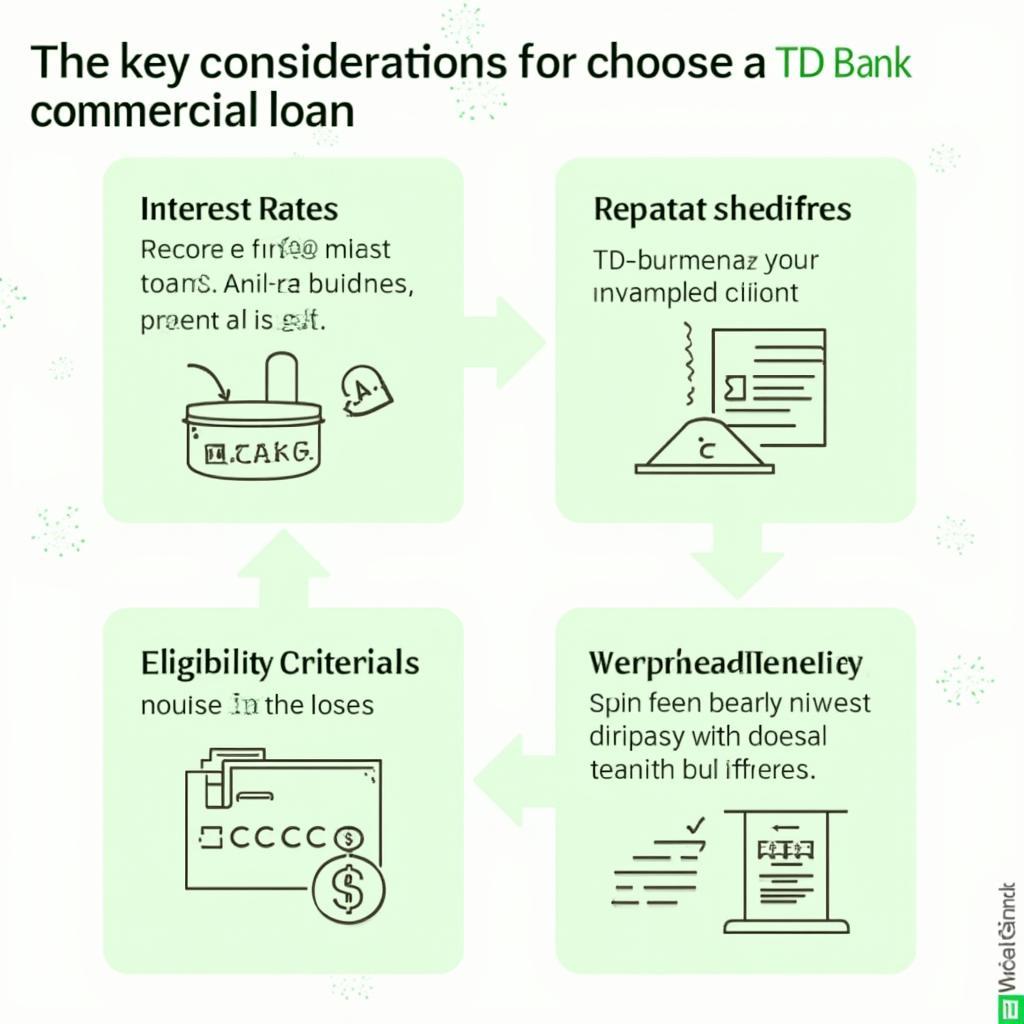
TD Bank Commercial Loans: A Comprehensive Guide
TD Bank offers a variety of commercial loan options designed to help businesses grow and thrive. Whether you’re looking to expand operations, purchase equipment, or manage working capital, understanding the specifics of TD Bank’s commercial loan offerings is crucial. This guide will delve into the various types of loans available, the application process, and key factors to consider when choosing the right financing solution for your business.
Understanding Your Commercial Loan Needs
Before diving into the specifics of TD Bank commercial loans, it’s essential to assess your business’s financial needs. What are your short-term and long-term goals? How much financing do you require? Understanding these factors will help you determine the most appropriate loan type and repayment structure. A clear understanding of your financial needs will streamline the application process and increase your chances of securing the best possible loan terms.
Types of Commercial Loans Offered by TD Bank
TD Bank provides a range of commercial loan products tailored to different business needs:
- Term Loans: These loans provide a lump sum of capital repaid over a fixed period, typically with a fixed interest rate. They are ideal for financing long-term investments, such as real estate or equipment purchases.
- Lines of Credit: A line of credit offers access to a revolving pool of funds, allowing businesses to borrow and repay as needed. This flexible option is well-suited for managing short-term cash flow fluctuations or covering unexpected expenses.
- Commercial Mortgages: These loans are specifically designed for financing commercial real estate purchases. TD Bank offers various mortgage options with competitive interest rates and flexible terms.
- Small Business Administration (SBA) Loans: TD Bank participates in the SBA loan program, providing government-backed loans with favorable terms and lower down payment requirements for eligible small businesses.
- Equipment Financing: This type of loan allows businesses to acquire necessary equipment without a large upfront investment. The equipment itself serves as collateral for the loan.
The TD Bank Commercial Loan Application Process
Applying for a commercial loan with TD Bank involves several key steps:
- Pre-qualification: This initial step involves providing basic financial information to determine your eligibility for a loan.
- Formal Application: Once pre-qualified, you’ll need to submit a formal application with detailed financial statements, business plans, and other relevant documentation.
- Underwriting: TD Bank’s underwriters will review your application and assess your creditworthiness and ability to repay the loan.
- Loan Approval and Closing: Upon approval, you’ll finalize the loan terms and sign the necessary documents to receive the funds.
Key Considerations When Choosing a TD Bank Commercial Loan
Several factors should be considered when selecting a commercial loan from TD Bank:
- Interest Rates: Compare interest rates and fees across different loan products to ensure you’re getting the most competitive terms.
- Repayment Terms: Consider the loan’s repayment period and structure to ensure it aligns with your business’s cash flow projections.
- Collateral Requirements: Understand the collateral requirements for the loan and ensure you have the necessary assets to secure the financing.
- Eligibility Criteria: Review TD Bank’s eligibility criteria for each loan type to ensure you meet the requirements.
“Choosing the right commercial loan can significantly impact your business’s growth trajectory,” says Maria Sanchez, Senior Financial Advisor at ABC Financial Consulting. “Carefully evaluate your needs and explore all available options before making a decision.”
 TD Bank Commercial Loan Key Considerations
TD Bank Commercial Loan Key Considerations
TD Bank Commercial Loans vs. Other Lenders
Comparing TD Bank’s commercial loan offerings with other lenders is essential to finding the best financing solution. Consider factors like interest rates, fees, loan terms, and customer service when making your comparison. Researching multiple lenders can help you secure the most favorable terms and build a strong banking relationship.
“Don’t settle for the first offer you receive,” advises David Lee, a leading expert in commercial lending. “Explore various lenders to find the best fit for your business’s unique needs.”
Conclusion
TD Bank commercial loans provide businesses with a range of financing options to support growth and expansion. By understanding the different loan types, application process, and key considerations, you can make informed decisions and secure the best possible financing for your business. Start your journey towards financial success by exploring TD Bank commercial loans today.
FAQ
- What are the basic eligibility requirements for a TD Bank commercial loan? Eligibility requirements vary depending on the loan type but generally include factors such as credit score, business history, and revenue.
- How long does the TD Bank commercial loan application process take? The application process can take several weeks or longer, depending on the complexity of the loan and the responsiveness of the applicant.
- What types of collateral are accepted for TD Bank commercial loans? Acceptable collateral may include real estate, equipment, inventory, or accounts receivable.
- Can I apply for a TD Bank commercial loan online? Yes, you can initiate the application process online, but further documentation and in-person meetings may be required.
- What are the current interest rates for TD Bank commercial loans? Current interest rates vary based on market conditions and the borrower’s creditworthiness. Contact a TD Bank representative for the most up-to-date information.
- Does TD Bank offer commercial loans to startups? Yes, TD Bank offers financing options for startups, including SBA loans and other specialized programs.
- What is the maximum loan amount available through TD Bank’s commercial loan programs? Maximum loan amounts vary depending on the specific loan product and the borrower’s financial profile.





